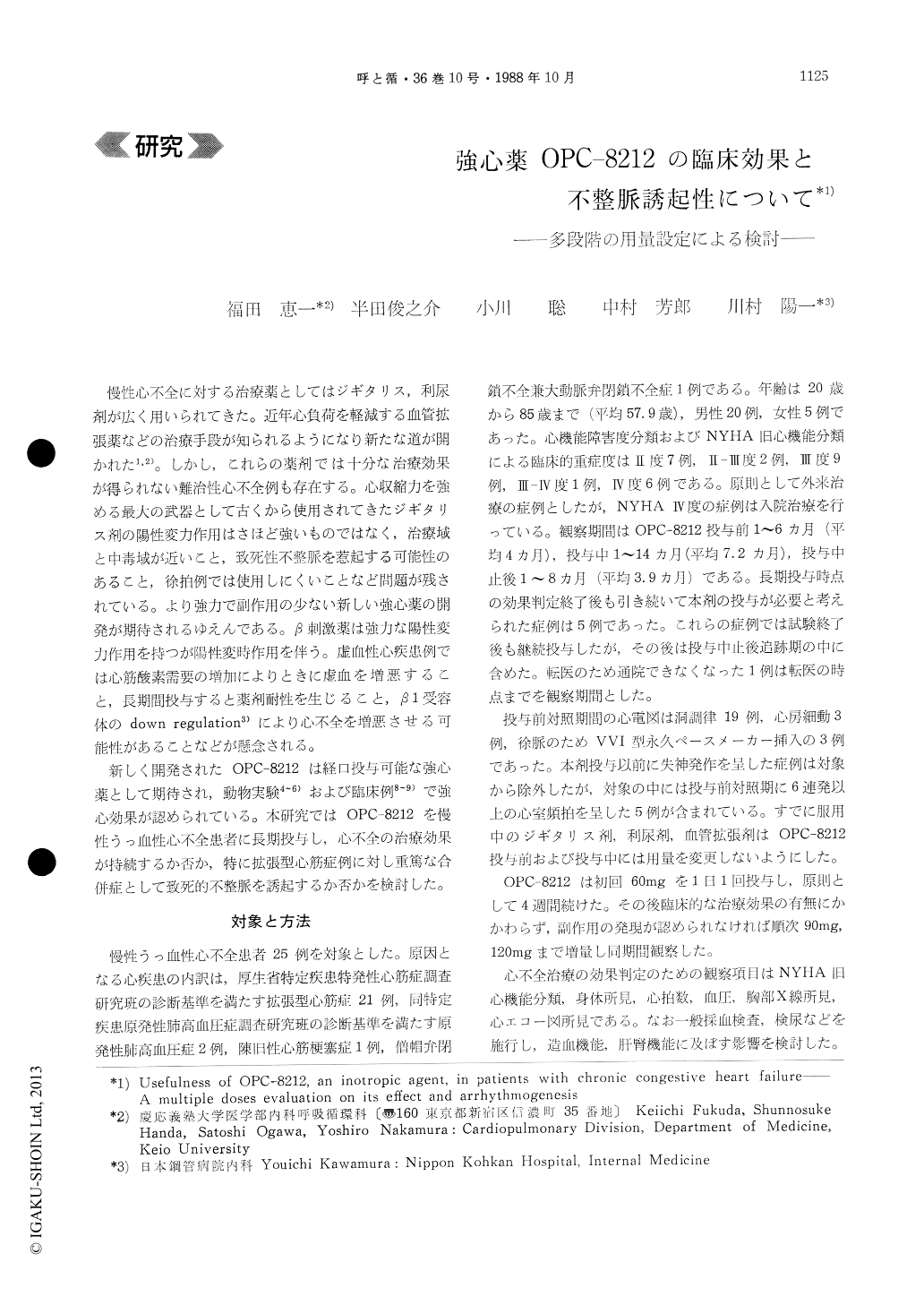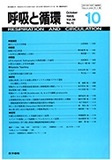Japanese
English
- 有料閲覧
- Abstract 文献概要
- 1ページ目 Look Inside
慢性心不全に対する治療薬としてはジギタリス,利尿剤が広く用いられてきた。近年心負荷を軽減する血管拡張薬などの治療手段が知られるようになり新たな道が開かれた1,2)。しかし,これらの薬剤では十分な治療効果が得られない難治性心不全例も存在する。心収縮力を強める最大の武器として古くから使用されてきたジギタリス剤の陽性変力作用はさほど強いものではなく,治療域と中毒域が近いこと,致死性不整脈を惹起する可能性のあること,徐拍例では使用しにくいことなど問題が残されている。より強力で副作用の少ない新しい強心薬の開発が期待されるゆえんである。β刺激薬は強力な陽性変力作用を持つが陽性変時作用を伴う。虚血性心疾患例では心筋酸素需要の増加によりときに虚血を増悪すること,長期間投与すると薬剤耐性を生じること,β1受容体のdown regulation3)により心不全を増悪させる可能性があることなどが懸念される。
新しく開発されたOPC-8212は経口投与可能な強心薬として期待され,動物実験4〜6)および臨床例8〜9)で強心効果が認められている。本研究ではOPC-8212を慢性うっ血性心不全患者に長期投与し,心不全の治療効果が持続するか否か,特に拡張型心筋症例に対し重篤な合併症として致死的不整脈を誘起するか否かを検討した。
OPC-8212 (Otsuka Pharma. Co. Ltd) is a non-catecholamine, non-glycosidic inotropic agent newly synthesized in Japan. Recent studies revealed its acute and chronic positive inotropic effect in both healthy men and patients with chronic heart failure. However, arrhythmias as a side effect of these agents related with positive chronotropic effect may occur. The purpose of this study is to clarify the efficacy and safety of OPC-8212, particularly the dosedependent arrythmogenesis, during the long term oral therapy in patients with chronic conge-stive heart failure. The study group consisted of 25 patients with congestive heart failure, 20 men and 5 women with a mean age of 57. 9 years (range from 20 to 85). Sixty mg to 120 mg of OPC-8212 was orally given once daily for at least 1 month and no more than 14 months at maximum. Chest X-ray, echocardiography and routine check ups for the evaluation of chronic heart failure were perfo-rmed. Arrythmias were monitered repeatedly by Holter electrocardiography before and during the therapy with OPC-8212 (average 1.6 times during control period and 3.3 times during therapeutic period). Clinical improvement in CHF was observed in 13 of 25 patients and mean improvement of NYHA classification changed from 2.94 to 2.54 after treatment with OPC-8212. Two patients died during the therapeutic period, one due to heart failure and the other probably due to arrhytmia. There was no change in heart rate and blood pressure throughout the therapy period. Neither de novo atrial fibrillation nor paroxysmal supraven-tricular tachycardia occured. The total number of ventricular premature beats did not increase except in 4 patients. None of these patients revealed dose dependency in the number of VPB. No sustained VT was observed. There were no changes in PQ interval and QTc. In conclusion, Clinical symptoms in patients with chronic heart failure were improved after once-a-day treatment with OPC-8212 at 60 to 120 mg. No significant arrythmogenic side effect of OPC-8212 was observed. The arrythmogenesity of this agent might be minimal in these clinical settings.

Copyright © 1988, Igaku-Shoin Ltd. All rights reserved.


